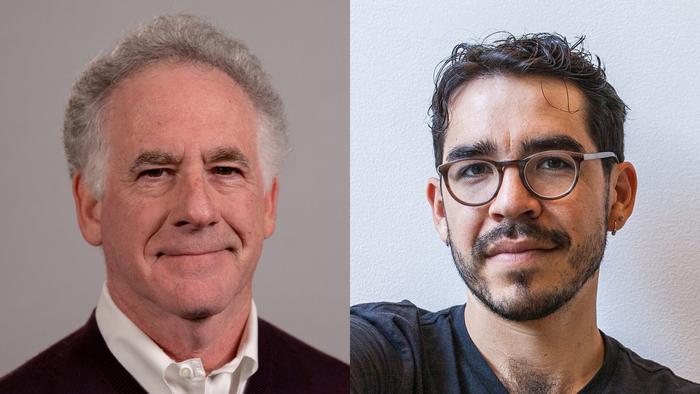USC faculty members Paul K. Newton and Nicolás Lell Benavides have been awarded prestigious Guggenheim Fellowships for 2024.

Credit: (Photos/Vivian Sachs; Courtesy of the USC Viterbi School of Engineering)
USC faculty members Paul K. Newton and Nicolás Lell Benavides have been awarded prestigious Guggenheim Fellowships for 2024.
Newton, professor of aerospace and mechanical engineering and mathematics at the USC Viterbi School of Engineering, and Benavides, a lecturer at the USC Thornton School of Music, were chosen by the John Simon Guggenheim Memorial Foundation from nearly 3,000 applicants. They are among 188 inductees chosen this year for their excellence in scholarship and the arts.
“Humanity faces some profound existential challenges,” said Edward Hirsch, president of the foundation. “The Guggenheim Fellowship is a life-changing recognition. It’s a celebrated investment into the lives and careers of distinguished artists, scholars, scientists, writers and other cultural visionaries who are meeting these challenges head-on and generating new possibilities and pathways across the broader culture as they do so.”
USC Guggenheim Fellow Paul K. Newton: Modeling cancer evolutions models using game theory
Newton has been awarded a 2024 Guggenheim Fellowship for his pioneering work using game theory to study and develop cancer evolution models.
As an applied mathematician in USC Viterbi, Newton’s use of computational models to predict the ways that tumor cell populations organize, compete, evolve and disperse in their human hosts is recognized for its revolutionary potential to control and manage cancer progression at an early stage of the disease.
“While these topics have long been the focus of medical oncologists and molecular biologists, only recently have physical scientists and applied mathematicians begun to develop quantitative and predictive models that can shed light on some of the most pressing questions in this field,” Newton said.
During his fellowship, Newton will be visiting cancer centers across the United States to learn from different practitioners. “Working together, we can build more effective computer simulations of cancer progression based on mathematical models informed by longitudinal patient data,” Newton said. “I think that is the future of this field — groups of medical specialists making decisions partially informed by scientists and modelers who are providing simulations to predict what might happen under differing scenarios.”
As a leader in the field of computational oncology, Newton is distinguished for his creative and cross-disciplinary approach. The use of evolutionary game theory to understand tumor ecology arises from a paradigm that views the cancer cell and immune system dynamics of a tumor as a co-evolving population, with Darwinian selection at work. In predicting the processes of natural selection driven by cellular heterogeneity and clonal competition — especially as regards drug resistance — these models have the potential to inform more effective methods to steer the evolutionary dynamics of a tumor.
With the support of the Guggenheim Fellowship and collaboration with cancer centers across the United States, Newton is hopeful that cancer could eventually be treated as a manageable disease — much like diabetes — with monitoring and adaptive control of chemotherapy scheduling.
USC Guggenheim Fellow Nicolás Lell Benavides: Composing a tribute to family and perseverance
Composer Benavides, a USC Thornton alumnus and current faculty member, has been praised for ambitious, modern operas that bring characters to life and chamber music that features wide-ranging influences. He’ll spend the year completing an array of creative work.
“It’s humbling to be recognized by colleagues whose work I admire so much, and to join so many of my mentors at USC Thornton School of Music with this distinction,” Benavides said. “The legacy of achievement and artistry over 99 years of fellowships is breathtaking, and I’m so grateful to be part of the newest cohort.”
He joins a list of current composition faculty who have been honored with a Guggenheim Fellowship, including Donald Crockett, Andrew Norman and Nina C. Young. As a part-time lecturer, the award will allow Benavides to focus on his art. “I do not have the same sabbatical opportunities as many tenured faculty, and an award like this can allow me to take needed time away to focus on my most ambitious creative projects,” he said.
Benavides will use the Guggenheim Fellowship on numerous projects, including finishing the opera Dolores about labor organizer and civil rights icon Dolores Huerta, which is scheduled for a rolling premiere in 2025 with West Edge Opera, San Diego Opera, The BroadStage and Opera Southwest. Huerta and Benavides are cousins who were featured by USC in last year’s commencement coverage when both earned doctorates from the university.
He’ll also embark on a new chamber work for the Grammy Award-winning ensemble Eighth Blackbird in conjunction with the Barlow Endowment. Among his other projects are releasing an album that explores the culture, language and music of New Mexico called Canto Caló for Innova Recordings, finishing demos and finding a commissioner for the Latin jazz-inspired comic opera Caravana de mujeres. Additionally, he’ll work on a variety of soon-to-be-announced chamber works, including a large-scale piece about grief and loss for tenor, oboe and string quartet to premiere in Los Angeles in January 2025.
It’s a dizzying and enthralling output. The many compositions he’ll take on reflect a preference for finding inspiration in a diverse portfolio of work.
“The Guggenheim Fellowship will allow me to spend time experimenting with sounds and colors I usually wouldn’t have time to consider and tackle more projects than I normally would be able to do,” Benavides said.
About the Guggenheim Fellowship: Created in 1925 by U.S. Sen. Simon Guggenheim and his spouse, Olga Guggenheim, the John Simon Guggenheim Memorial Foundation offers fellowships to exceptional individuals in pursuit of scholarship in any field of knowledge and creation in any art form.
Applications for the fellowship undergo review by experts in each applicant’s field. Fewer than 200 Guggenheim Fellowships are then awarded to individuals who have demonstrated exceptional capacity for productive scholarship or exceptional creative ability in the arts.



